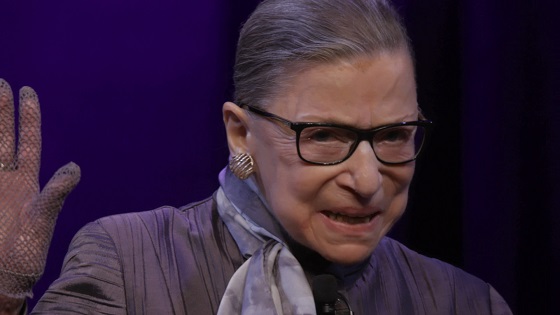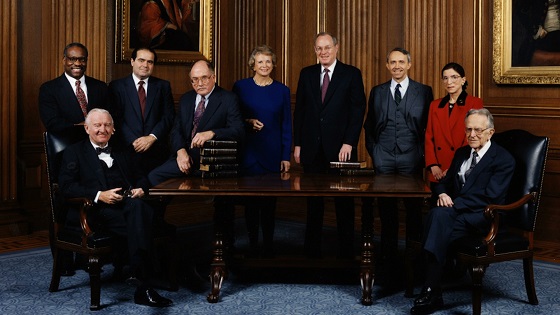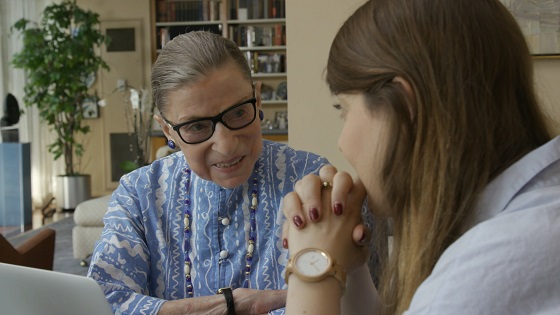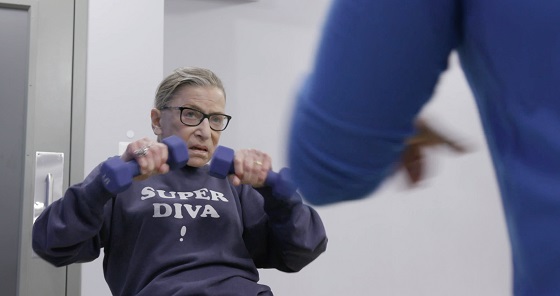In her long and storied career, Ruth Bader Ginsburg has gone from lawyer to judge to Supreme Court justice. But perhaps her most interesting accomplishment has been becoming an internet meme, an inspirational figure for both modern women and liberal activists all over America. Her fascinating story is the subject of a new documentary, appropriately entitled RBG.
RBG is Ginsburg’s tale, told by those who know her best. Through interviews with students, colleagues, and employees, Ginsburg’s story unfolds deliberately from her humble beginnings as the child of Russian Jewish immigrants to her Supreme Court battles that have earned her the proud title of “The Great Dissenter.” It also dips into her personal life, using interviews with her children and childhood friends to shine a light on her relationship with her beloved husband, Marty. And it’s all strung together with slick editing and a hip rap soundtrack.

RBG was an obvious labor of love for directors Julie Cohen (American Veteran, The Sturgeon Queens) and Betsy West (The Lavender Scare, Constantine’s Sword). They approach not only Ginsburg but her life and accomplishments with a certain sense of awe and hero-worship. There’s even a quote from an interviewee that claims that Ginsburg is the “closest thing to a superhero I know.” There’s no opposing viewpoint or controversial opinions in the film. It’s a celebration, not a confrontation. And anyone who would want to see RBG already knows that they’re going to celebrate along with the movie.

But RBG is not just a celebration of the larger-than-life petite (and absolutely adorable) Supreme Court justice. It’s a celebration of her fight for equal rights and her crusades for downtrodden Americans everywhere. Although the film covers the entire span of her life and career, it does focus on just a handful of Ginsburg’s more precedent-setting cases, mostly involving discrimination. And it’s not just women who are being discriminated against – one case that Ginsburg argued successfully dealt with a widower who was being denied his late wife’s Social Security payments because he was “the husband.”

It’s surprising to look back on Ginsburg’s time on the court and see how things have changed. Upon her appointment by Bill Clinton in 1993 (confirmed 96-3, and only the second woman behind Reagan appointee Sandra Day O’Connor), she was considered a “middle liberal” who bridged the gap between sides to open the lines of communication with the conservatives, especially O’Connor, a moderate Republican). But, after the court went through a couple of George W. Bush terms, she slid farther to the left and had to dissent more in order to have her voice heard.

There is plenty of fun, non-politicized moments in RBG that humanize the icon that has become known to her supporters as “The Notorious RBG.” She loves opera and is shown performing in a bit role with the Washington National Opera. She pokes fun at how her late husband, Marty, would not allow her to cook at home. Her sweet friendship with opposing court judge Antonin Scalia is exposed, the pair expressing fondness for each other despite hating their respective politics. There’s also a fun section where Cohen and West show her for the first time the impression that comedian Kate McKinnon (Ghostbusters) does of her on “Saturday Night Live.”

But the best non-political moments in RBG come when Ginsburg is shown working out in the gym with her trainer. Her frail frame pushes tiny weights with determination and fortitude, giving the viewer the impression that, even at age 85, she’s a powerhouse. And that’s a good thing because right now, America needs voices like those of RBG to hang around for a long time.
